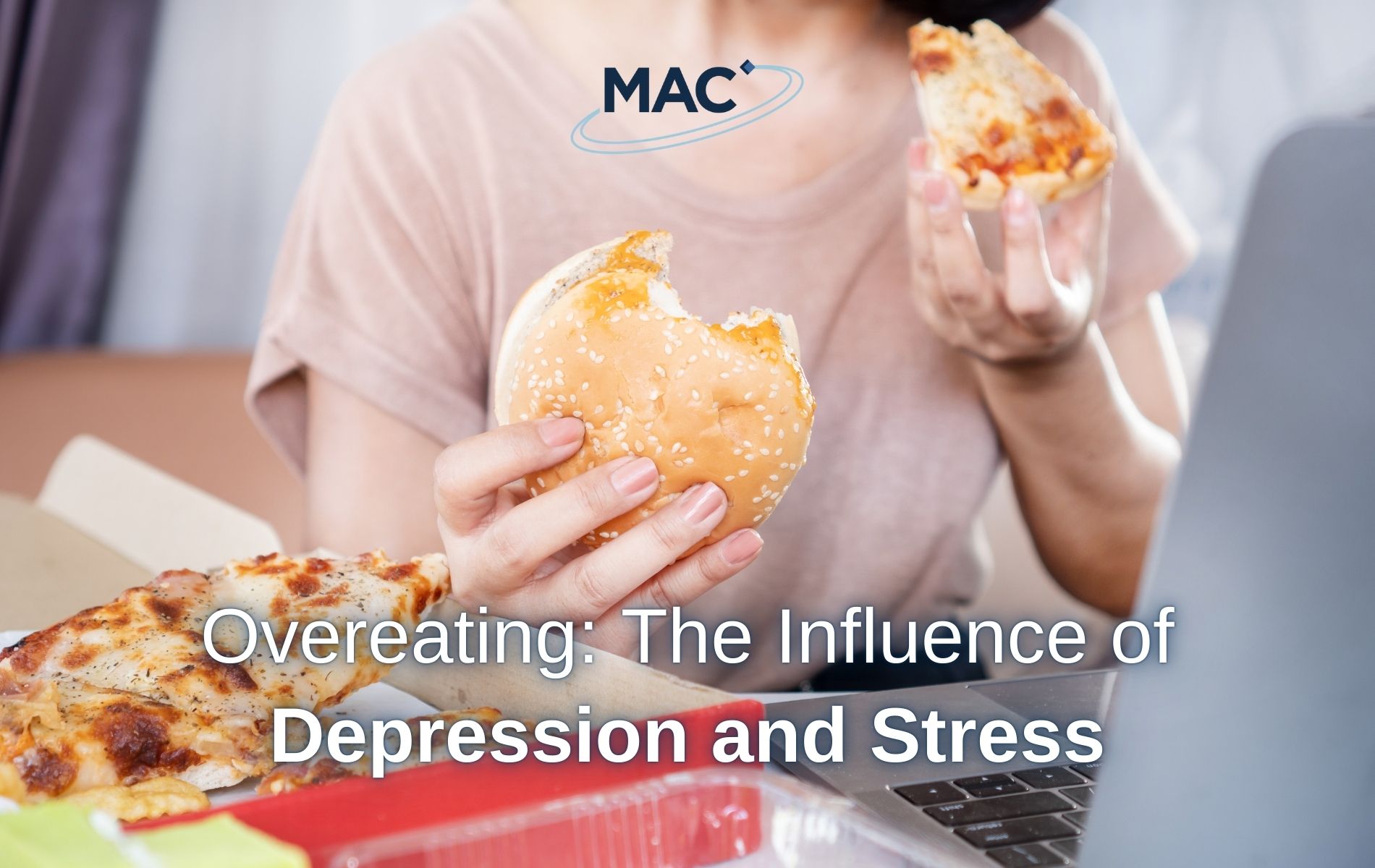With our ever-present diet culture facing off against super-sized fast-food portions, it can be difficult to know whether we are eating too much or what it means to overeat. Overeating can be harmful to our physical and mental health; it is important to be aware of the behaviour before it becomes chronic, and understand how emotional overeating and depression are closely related
What is overeating?
Overeating is eating past the point of fullness, something many of us are guilty of occasionally doing. However, when this behaviour becomes habitual, it can begin to have negative effects on your physical and mental health. Some of the risks of overeating include:
- May promote excess body fat: eating more calories than you burn in a day may lead to your body storing additional calories as fat.
- May disrupt hunger regulation: your appetite and feelings of fullness are controlled by hormones, and continually overeating may disrupt this balance1.
- May disrupt reward pathways: your brain releases dopamine in response to pleasurable sensations, such as eating foods high in salt, fat and sugar2. Over time, your body may associate these sensations with certain foods, encouraging you to eat for pleasure over hunger3.
- May increase your risk of disease: chronic overeating can lead to obesity, which can increase your risk of heart disease, stroke, and diabetes4.
- May impair brain function: overeating and obesity have been linked to cognitive decline and memory issues in older adults5,6.
Reasons for overeating
There are many reasons why you might over-indulge. Mental health can have a significant impact on our relationship with food and eating. Your mood can impact the amount you eat, and the amount you eat can influence your mood7.
This is especially true for stress. When we are stressed, our body floods with a hormone called cortisol. Cortisol has many effects on the body, like increased heart rate, blood pressure, and muscle tension; it also increases the drive to find food and may make us crave foods high in sugar, fat, or salt8. Therefore, if you are experiencing chronic and prolonged stress, you may be more likely to eat those foods and more likely to consume larger amounts of them.
Another reason that you might overeat is as a source of comfort. Research has found that many people living with depression turn to food as a self-soothing mechanism9. Foods high in fat, salt, and sugar may temporarily combat the negative effects of depression by causing a surge of dopamine, bringing with it feelings of pleasure, motivation, and satisfaction10. However, over time you may need to increase your consumption to maintain these feelings, leading to overeating and subsequent weight gain and its associated health risks, as well as worsening feelings of guilt or shame, which makes depression worse.
Tips for reducing overeating
The first step to maintaining healthy eating habits is to recognise the signs of fullness. The amount of food you need to eat will vary depending on your sex, weight, metabolism, age, and physical activity level.
- Find other coping mechanisms to manage your stress levels. Consider meditation to help you be more mindful of food choices, or exercise to give you that surge in ‘happy’ hormones. You should also pay attention to what emotions or situations make you want to eat, like stress, boredom, or sadness; therapy can help you to work through feelings of stress, anxiety, or sadness that may lead to overeating.
- Reach out to others to help keep yourself accountable. Whether it’s working with a nutritionist to come up with a healthy meal plan, meal-prepping with loved ones, or speaking with someone when you feel the need to overeat, your support system is critical.
- Get quality sleep and try to maintain a regular sleep schedule, as research has shown that we are more vulnerable to craving calorie-dense high-fat foods after a sleepless night11.
- Eat mindfully by choosing more filling, nutritionally dense foods and avoid snacking while you’re distracted. Savouring your food can help you recognise when you’re full, and it’s better for digestion. It can also be beneficial to wait before going to get more food and do something to take your mind off eating. This time allows you to assess whether you are still hungry, or if you’re giving into the impulse to overeat.
- Plan out your meals when you know you are most likely to overeat. For example, if you know that you would usually feel too tired to cook on a certain day, plan a simple and quick meal ahead of time so that you avoid giving in to the temptation of a takeaway.
Around one in six (16%) adults experience moderate to severe depressive symptoms in their lifetime12, however, up to a third of people living with depression don’t get better with the current available treatments13. MAC Clinical Research will be conducting new studies for potential depression treatments, but we need your help. If eligible, you will receive payment for your time and commitment, additionally, reasonable travel expenses will be paid. To keep up-to-date with our latest clinical trials, register your interest via our future studies page.
References
1 Healthline – 7 Ways That Overeating Affects Your Body
2 PMC – Mood, food, and obesity
3 PMC – Variety, Palatability, and Obesity
4 PMC – The Medical Risks of Obesity
5 ScienceDirect – Obesity-related cognitive impairment: The role of endothelial dysfunction
6 PubMed – Overweight and cognition
7 Canadian Journal of Public Health – Mental Health and Eating Behaviours: A Bi-directional Relation
8 Cleveland Clinic – Overeating: Causes, Symptoms & How to Stop
11 eLife – Olfactory connectivity mediates sleep-dependent food choices in humans
12 Office for National Statistics – Cost of living and depression in adults, Great Britain
13 PMC – Treatment-resistant depression: therapeutic trends, challenges, and future directions




